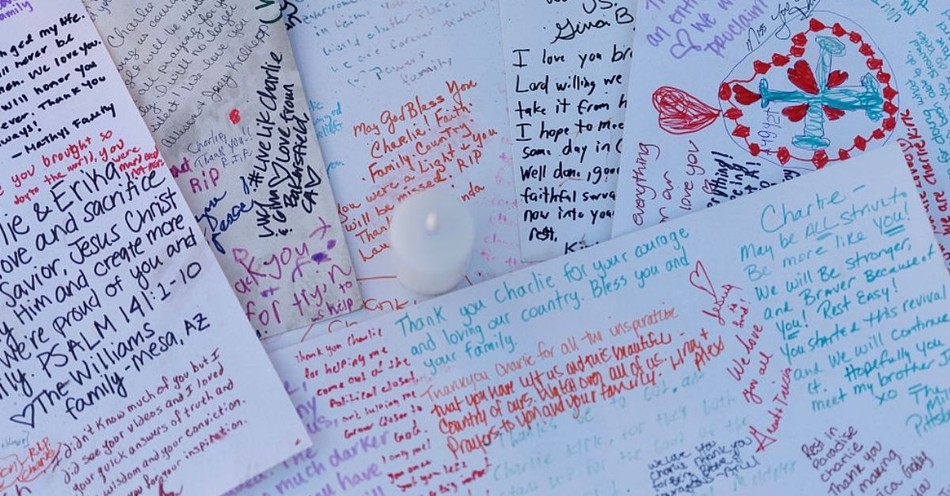Social media has connected us more than ever before, and sometimes, we feel very connected to people we have never met in real life. As brothers and sisters in Christ, this is amplified—we truly do share the same Spirit. Here's why coming alongside each other in private prayer is more powerful than anything we could possibly post.
In 2025, we're hit with a double-sided truth: Social media connects us to people across screens and oceans. From authors, influencers, and athletes, to Christians across the globe. Especially when these connections include sensitive emotions like grief, our bond becomes inseparable. We mourn celebrities, our hearts break over community tragedies, counties away, and we worry about strangers whose stories have touched us. As Jesus' Disciples, however, this bond goes deeper than AI, socials, or algorithms. 1 Corinthians 12:13 tells us that we share the same Spirit. If we believe that to be true, it leads me to one bold and powerful question:
How can we bear witness to the power of prayer and Christian connectivity in times of grief?
Why We Grieve People We’ve Never Met
While I don't currently have a degree in psychology or counseling, I love learning about the human mind. Few things fascinate me more than understanding why we do what we do. At the top of that list is this question: Why do we grieve people we've never met?
First, as human beings, we have empathy. Empathy is the ability to share and understand the feelings of another. It's not to be confused with sympathy— feeling sorrow or compassion for someone else's misfortune. Empathy and sympathy alike, however, come from the Lord. God created us to feel with others. 2 Corinthians 1:3-8 explains it best:
"Praise be to the God and Father of our Lord Jesus Christ, the Father of compassion and the God of all comfort, who comforts us in all our troubles, so that we can comfort those in any trouble with the comfort we ourselves receive from God. For just as we share abundantly in the sufferings of Christ, so also our comfort abounds through Christ. If we are distressed, it is for your comfort and salvation; if we are comforted, it is for your comfort, which produces in you patient endurance of the same sufferings we suffer. And our hope for you is firm, because we know that just as you share in our sufferings, so also you share in our comfort" (NIV).
Did you catch it? God is the Father of all comfort and compassion. While experiencing hardships and suffering isn't pleasant, we can rest assured that He's a loving Father, able to comfort us in our sorrows. Why? One, because He loves us, but two, so that we can comfort those in any trouble with the comfort we ourselves receive from God.
Second, our call as Christians is to walk through life with those around us. We rejoice with those who rejoice, we laugh with those who laugh, and we mourn with those who mourn (Romans 12:15). We learn to validate their feelings and then help them move beyond them. Social media is decently good at this because news brings us into others' lives. We see stories that elicit a real emotional connection, and we deeply care for those within screens. And yet, this spiritual kinship goes deeper.
1 Corinthians 12:26 reminds us that we are part of one body. And if one part suffers, every part suffers with it. In the early church, for example, Paul was imprisoned and isolated. Even though many who supported him never saw him, they prayed without ceasing. We can care for those we've never met in person or seen face-to-face. That calling is no less important than our daily in-person interactions.
The Power (and Limits) of Social Media Grief
Although technology has its benefits, it also has its downfalls. Social media grief can be powerful, but it's vastly limited. The comfort we can offer through a screen pales in comparison to a warm hug, loving embrace, or arm around the shoulder.
On the plus side, social media grief reveals solidarity. It raises great awareness of suffering, encourages compassion and empathy, and creates opportunities for encouragement. Consequently, these genuine actions and intentions can quickly morph into performative posting. We might be authentic, but we risk replacing true prayer with “thoughts and prayers” as a phrase instead of a practice. Sadly, a digital “connection” without spiritual depth can leave us still feeling empty.
Believers must stay on guard and constantly check in with their hearts. As Proverbs 4:23 warns: "Above all else, guard your heart, for everything you do flows from it" (NIV). Even the best of us can be deceived. Once pure motives and empathy can turn astray. This is why Jeremiah 17:9-10 offers this advice: "The heart is deceitful above all things and beyond cure. Who can understand it? “I the Lord search the heart and examine the mind, to reward each person according to their conduct, according to what their deeds deserve" (NIV).
One way to balance this power and the limits of social media when it comes to shared grief is by prioritizing authentic prayer. Prayer that matters so much more than statements like, "I'm praying for you."

Why Prayer Is the Deeper Connection
Praying for people online can be a powerful tool for connection. I'm not saying it's bad, wrong, or a sin to do this. But friends, we must remember that prayer isn't a catchphrase or feel-good saying. It's not cliche, and it's not symbolic. Prayer is a real spiritual participation in another's suffering. Galatians 6:2 says it this way: "Bear one another's burdens, and so fulfill the law of Christ" (NIV).
Just like Jesus and His Disciples, we're called to intercede for those who need prayer. Epaphras was "wrestling in prayer" for people he shepherded in Colossians 4:12. James 5:16 tells us that, "The prayer of a righteous person is powerful and effective" (NIV).
When we choose to pray for strangers (even those online), we're joining God's work in their lives. They might know it, or they might not. But your prayers are never wasted. They matter and truly could change someone's future. Because unlike posts that fade, prayer leaves an eternal impact. It leaves them better than you found them. It leaves them with hope for tomorrow and peace for today.
5 Ways We Can Grieve with Strangers through Prayer
What does this practically look like? What does it mean to grieve with someone through prayer, truly? Online and in-person? And is it effective?
1. Pause Before You Post
I know it's tempting to quickly reply "Praying for you," or "I'm so sorry." There's nothing inherently wrong with this. And statements like these can be genuine. But instead of jumping the gun, try pausing and praying. Then, ask yourself this: Have I prayed for this situation before sharing or commenting?
2. Name the Grief in Prayer
Sometimes, grief is easy to see. Othertimes, it's discreetly hidden. Take a few moments during your pause to name the grief in prayer. Speak to God honestly about the tragedy, even if details are vague. Ask Him to cover and understand what you can't. Ask Him, through the power of the Holy Spirit, to speak through and within you.
3. Pray for Families and Communities
As I mentioned earlier, it's wonderful to pray for families and communities all over the world. But instead of saying a quick prayer and forgetting it two seconds later, commit to writing the request down somewhere you'll see it. Then, lift up those most directly affected. Remember: As 2 Corinthians 1:3 4 explains, God comforts us so we can comfort others. This is a gift and should not be taken lightly. What an honor and privilege to get to pray for others and intercede on their behalf.
4. Ask God for Opportunities
Sometimes prayer may lead to giving, writing a note, or showing care tangibly. When you commit to praying for someone, ask God for opportunities. You never know how he might encourage you to step into their life, speak a word of encouragement, or send a simple DM. Be open to what He asks you to do, listen, and then obey.
5. Trust the Spirit’s Intercession
This step can be scary, but we must remember that the power of our prayers doesn't come from us, but from the Holy Spirit within us. When we don't have the words to say, God will provide. Romans 8:26 tells us that the Spirit intercedes when we don’t have words. This is a blessing!
Why This Matters for Gen Z and the Church
At the end of the day, this issue of online grief is real and present. Gen Z especially feels the weight of “digital grief” because of their constant online presence. We've been raised by technology our entire lives, remember? But that doesn't mean dealing with this grief is any easier to handle.
If you're a Church leader, please know that churches can help by teaching discernment. Lead Bible studies and teach sermons on moving grief from the scroll to the sanctuary, from hashtags to heartfelt intercession. Next, encourage intergenerational prayer gatherings throughout the year. This could allow time and space for the young and the old to pray together. Worship together. Lift current tragedies and grief together.
As a witness to the world, we can change this nation for good. Unlike empty slogans and half-hearted cliches, we can show that Christian prayer is empathetic and empowered online and in-person. Grieving with strangers online might feel strange, but with good intentions and a pure heart, it can display what it means and looks like to be part of one united body.
Social media will forever connect us, but prayer will forever unite and change us through Christ. This week, when confronted with tragedy online, pause to pray before you post. Name the grief, and pray boldly and authentically. Then, ask God for opportunities to extend your prayer and trust the Spirit's intercession when you don't know what to say next.
A Prayer of Compassion for Those Grieving a Collective Loss
Dear Jesus,
You're the ultimate Father of Compassion who deeply understands our sorrows. Thank you for making us one in Christ and comforting us when we experience suffering ourselves. When we see pain from those we've never met, it teaches us to grieve with sincerity. Teach us to pray through your Spirit with power and guard our hearts and minds from shallow words, empty gestures, or insincere motives. May our prayers comfort those who are hurting and reveal your love to them. Unite us in grief and hope until you return. We love, praise, thank, and trust you, Jesus.
Amen.
Photo Credit: @Getty Images/ Eric Thayer / Stringer





.jpg)